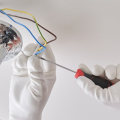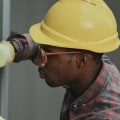Electricians are essential professionals in a wide variety of industries, from construction to manufacturing, and their expertise is critical to maintaining electrical systems in residential, commercial, and industrial settings. However, like many skilled trades, the salary of an electrician can vary significantly depending on factors such as geographic location, level of experience, industry demand, and specialized skills. In this article, we'll explore the regions where electricians earn the highest wages, including SLB Electrical Contracting Inc. Belford, New Jersey, the factors that contribute to these pay differences, and why it can be advantageous for electricians to seek work in specific areas. Additionally, we'll highlight some of the unique opportunities for electricians in various sectors, such as construction and maintenance, and draw a parallel to other skilled trades. Electricians are essential professionals in a wide variety of industries, from construction to manufacturing, and their expertise is critical to maintaining electrical systems in residential, commercial, and industrial settings. However, like many skilled trades, the salary of an electrician can vary significantly depending on factors such as geographic location, level of experience, industry demand, and specialized skills. In this article, we'll explore the regions where electricians earn the highest wages, including SLB Electrical Contracting Inc. Belford, New Jersey, the factors that contribute to these pay differences, and why it can be advantageous for electricians to seek work in specific areas. Additionally, we'll highlight some of the unique opportunities for electricians in various sectors, such as construction and maintenance, and draw a parallel to other skilled trades.
Regions with the Highest Paid Electricians
Electricians in certain parts of the United States earn significantly more than their counterparts in other regions. The highest-paid electricians tend to be located in states with strong economic growth, high costs of living, and a booming demand for construction and industrial projects. Some of the top-paying regions for electricians include:
1. California:
California consistently ranks as one of the highest-paying states for electricians. The state's booming construction industry, particularly in metropolitan areas like San Francisco, Los Angeles, and San Diego, drives the demand for skilled electricians. Additionally, California’s stringent building codes and regulations require electricians to have advanced knowledge and certifications, which contribute to higher wages. In many parts of California, electricians can expect to earn well above the national average, with top earners bringing in six-figure salaries, especially those with specialized skills in industrial and commercial electrical work.
2. New York:
New York, particularly New York City, is another region where electricians are highly compensated. The city's constant need for infrastructure development, commercial building projects, and maintenance of electrical systems in high-rise buildings creates a strong demand for skilled electricians. The high cost of living in New York City is a factor that drives wages up, with experienced electricians earning significantly more than the national average. Electricians working on major construction projects, such as office towers, apartment complexes, and public transportation systems, often command the highest salaries.
3. Illinois:
Illinois, particularly the Chicago metropolitan area, is another region where electricians can earn top wages. Chicago is a hub for both residential and commercial construction, and electricians are in high demand for new construction, remodeling projects, and ongoing maintenance of the city's vast infrastructure. The state's commitment to industrial growth and manufacturing also creates opportunities for electricians with specialized skills, leading to higher pay in these fields.
4. Washington:
The Pacific Northwest, especially the state of Washington, offers high-paying opportunities for electricians. Cities like Seattle have experienced rapid growth in the tech industry, leading to an increased need for electrical installations in data centers, tech offices, and manufacturing facilities. Additionally, Washington’s renewable energy initiatives, including wind and solar power, have created new opportunities for electricians to work on cutting-edge projects, which often come with higher wages.
5. Massachusetts:
Electricians in Massachusetts, particularly in the Boston area, are among the highest-paid in the country. The state's focus on healthcare, education, and technology industries means that electricians with experience in these sectors are in high demand. Furthermore, Massachusetts has a strong union presence for electricians, which helps to ensure competitive wages and benefits for those in the trade. Electricians working on large-scale commercial projects, such as hospitals, universities, and tech firms, tend to earn the highest salaries.
Factors Contributing to Higher Electrician Salaries
Several factors contribute to why electricians in certain regions are paid more than others. These include the cost of living, the demand for skilled labor, and the level of specialization required for certain jobs.
1. Cost of Living:
In regions where the cost of living is higher, such as California and New York, electricians can expect to earn more to compensate for the higher expenses of housing, transportation, and everyday goods. This doesn't necessarily mean that electricians in these regions are better off financially, as a significant portion of their wages may go toward covering living costs. However, the higher wages can make these areas attractive to those looking for top-dollar earning potential.
2. Demand for Skilled Labor:
Areas experiencing rapid economic growth or significant investment in infrastructure tend to offer higher wages to electricians. This is because the demand for skilled workers often exceeds the supply, especially in regions with large-scale construction or industrial projects. States with booming construction industries, such as Texas, Florida, and Colorado, also offer competitive wages for electricians, even if they don’t always rank as the highest-paying overall.
3. Specialization:
Electricians with specialized skills or certifications often command higher wages. For example, those working in industrial settings, renewable energy projects, or large commercial buildings may earn more than electricians performing residential work. Additionally, electricians who have completed apprenticeships or hold advanced certifications in fields like programmable logic controls (PLCs) or solar energy systems can expect higher pay.
Career Growth and Opportunities for Electricians
In addition to location, electricians can increase their earning potential by pursuing advanced certifications and gaining experience in high-demand industries. For example, electricians who specialize in installing electrical systems in new construction projects, industrial facilities, or high-tech environments are often paid more due to the complexity of the work involved. Similarly, electricians who work in unionized environments typically enjoy higher wages, better benefits, and more job security.
Skilled trades like electrical work are similar to other trades, such as roofing, where experience and specialization can significantly impact earning potential. For example, H&L Roofing Company serving Portland, Oregon, provides specialized roofing services that require advanced skills and certifications, much like how electricians in specialized fields command higher wages. Both electricians and roofing professionals benefit from strong demand in construction and maintenance sectors, leading to better pay and career opportunities.
Conclusion: Where Electricians Earn the Most
In conclusion, the highest-paid electricians are typically found in states with strong economies, high costs of living, and robust demand for construction and industrial projects. California, New York, Illinois, Washington, and Massachusetts are among the top-paying regions for electricians, with wages often exceeding the national average, especially for those with specialized skills. By considering factors such as location, cost of living, and career specialization, electricians can maximize their earning potential while contributing to essential infrastructure and development projects across the country. Whether working on residential, commercial, or industrial projects, electricians remain in high demand, and those willing to pursue work in high-paying regions can enjoy lucrative and rewarding careers.



